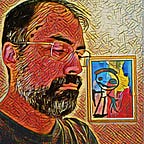During this time of remote classes
I’m writing this for my students, who were suddenly evicted from the classroom, while this pandemic has slowly become something that will just be with us, for a time that looks like forever. It will actually be forever, in a way. And the world is no longer the same as before. Meanwhile, the new world that should have come to replace the old one cannot yet be seen, and we are all as if in a boat, adrift, almost without metaphor. It is a time of global drift.
I write this text for you to read, and to think that our game is not the same now. What we are doing here is no longer normal, even if we try to give our work an air of normalcy — and admitting that this is what we should try to do, even without significant chance of success.
It can be said that our human connection now suffers, in addition to the loss of the sense of normality, other more concrete losses. The first one is the loss of physical closeness, and the ease of looking in the eye. The proximity of the bodies energizes communication, because it puts us on the same scene. You see, I don’t even need to talk about it, everyone knows how it is. This is what we lost, for not having our bodies on the same place. Eye contact is so strong, it can sometimes be discomforting, but it also allows you to speak in silence, while I speak loud, and alone, as if on a trance.
But there are other things going on now, which are gains, somehow. I can now feel free to show up in your house, as you are free to come to mine. Not uninvited, but still. I now, much more than before, participate in your time, and you in mine. Not only you, but everyone, all over the world, are sharing more and more of each other’s time and intimacy. Because we will be at home a lot (those of us who can, anyway), almost all the time, and probably for many months, we are in a certain way living in the same house. Together, perhaps more than ever.
And it is at this moment that I think what we say to each other, when we are online, can amount to a reconquered intimacy. We don’t have to tell ourselves our secrets. You don’t need to know about my problems, nor do I want to know about yours — except to the extent of what affects the organization of our work.
I always thought that the difference with distance education is the absence of silence. Because the technology used in these ways of teaching is generally asynchronous, something that is very important in communication does not happen, which is hesitation. Silence, dead time. Now, because we are all living together in this moment of freedom deprivation, it is as if silence has been regained, while we see each other from afar, and sometimes have nothing to say.
And that’s why I feel the need to tell you a few things:
- Understand that now is a great time to learn, precisely now, when it seems more doubtful than ever to give studying a practical motive, because what remains of learning, now, is its essence: to learn because one is human, and humans are human because they learn;
- It’s time to learn freely, just for the sake of it. I wish that, little by little, cautiously, we free ourselves a little from the bonds of formality. That we may assume a relationship of commitment to knowledge, as if we were returning to the times of the first universities, of the old academies, of the ancient lyceum, and of the old colleges. The great return of the appreciation for the good questions, not so much for the verdicts. Cautiously, though.
- Make no mistake: science is alive now, maybe more than ever. At a time when all authoritarianism seems ready to emerge, when it seems to be able to control everything that lives, at a time when the institutions of peace seem to crumble around the world, it is necessary to remember that science was born out of this kind of mud, and that it fought ignorance and authority, just when they seemed invincible, and won them over. It then lost itself, perhaps victim of its own success. Now, science has an opportunity to revive.
- What we are doing is incredibly important. That will become clear someday.
See you soon.
